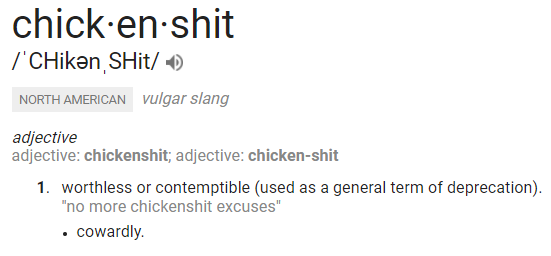
The Chickenshit Club by Jesse Eisinger is easily the best titled book to come out this year. It’s also the best titled book about fighting against corporations.
Enough about the title. The book itself is a slog, where readers endure an Old Testament-esque history of the Justice Department battling corporations over the last four decades.
This is unfortunate. I can safely say that the first two chapters of the book were brilliant. Focusing on the investigations into Enron and Arthur Andersen respectively, those chapters showcase what can go right and wrong for the Justice Department.
After the first two chapters the book pumps the brakes and starts going through the history of the Justice Department’s white collar investigations. Although a history lesson is not what I expected, the material is to provide insight into why the modern Justice Department operates as it does.
When I think of government, I think of bureaucracy and that’s not necessarily bad. The Justice Department is full of this, but it’s also full of strong opinions. The Chickenshit Club regales you with a lot of stories about strong personalities and how these strong personalities clashed not only with each other, but the strong personalities in both Securities and Exchange Commission and the Appellate courts. The book goes into too much depth about this. While it’s reassuring to know that there are some genuine crusaders fighting for justice, the book explores in detail how each major case over the last three decades sort of snow balled to where we are now.
It’s not as infuriating as The Smartest Guys In the Room, but it should be because the scope and magnitude of the supposed crimes are so much greater.

What made the Enron case successful is that the government approached it like a mob case. They started at the bottom and worked on flipping people to divulge more information. An approach like this takes time, especially if you want to work your way to the top and charge the C-level suite.
Nowadays it’s pretty rare for those at the top of the corporate ladder to be tried. Eisinger notes that “If prosecutors are thinking from the outset (even subconsciously) that they are going to reach some kind of settlement with the corporation, they focus less on top executives. Investigations of top executives are more time consuming. They require better evident, since the executives are much more likely to go all the way to trial rather than please guilty. An executive can go to jail. A company cannot.”
But it’s not just a matter of cases consuming time and materials; it’s often the personnel of the Justice Department. Eisinger notes that “young prosecutors want their adversaries to image them as future partners. They want to be seen as formidable but not unreasonable. They want to demonstrate that they are people or proportion.” It’s sad that mega law firms have castrated the moxie of prosecutors in the Justice Department.
The failure of legal moxie doesn’t lie solely with the Justice Department. The SEC and the court system are part of the problem as well. Dysfunction and a revolving door of personnel and policies contribute to the acrimony between the organizations. While those may be debilitating, most governmental bodies are more concerned with appearance – both to the public and the corporations – than actual substance.

Perhaps I should have tampered my expectations about this book because the title is so great, but I was hoping Eisinger would have some sort of solution to this mess. Money and resources aren’t a panacea to this rot. It probably doesn’t help that every couple years a new administration sets the tone for corporate crime, but book lacks a real stinger that makes you want to write your congressman and be an advocate for reform.
While not a solution to the issues at the Justice Department, The Chickenshit Club would benefit more from carefully injected invectitude. What made The Smartest Guys in the Room so great is that it was so enraging. Chickenshit Club gets nowhere near there. The book is a consumable history lesson, but it really only illustrates the Justice Department’s “cultural rot.”
While cultural rot is interesting to know about, I don’t believe it’s for everyone. Eisinger should have written to an audience who don’t follow the 24 hour news cycle. The American public in 2008 was mad as hell and weren’t going to take bailouts anymore. Now a decade later, their tolerance of corporate machinations has grown and slogans like “too big to fail” and “too big to jail” have lost their luster. We should still be angry ten years later because some terrible precedents have been established which will continue to shape our country to benefit corporations. The Chickenshit Club fails to re-ignite that anger.
